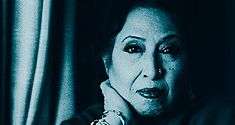Iqbal Bano
| Iqbal Bano | |
|---|---|
 | |
| Background information | |
| Born |
1935[1] Delhi, India |
| Origin | Rohtak, Punjab, India |
| Died |
21 April 2009[2] (aged 74) Lahore |
| Genres | Ghazal |
| Occupation(s) | singer |
| Years active | 1940s to 2000s |
| Website | |
Iqbal Bano (Urdu: اقبال بانو), Pride of Performance Award in 1974, (born 27 August 1935 in Delhi – died 21 April 2009, in Lahore)[2] was a highly acclaimed female Ghazal singer from Pakistan. She was best known for her semi-classical Urdu ghazal songs and classical thumris, but also sang easy-listening numbers in the 1950s films.[3]
Early life
Iqbal Bano was born in Delhi, India.[1][2] From a young age, she developed a love for music. It was a crucial moment of her life when her friend's father told Bano's father, "My daughters do sing reasonably well, but Iqbal Bano is especially blessed in singing. She will become a big name if you begin her training." Her father allowed her to study music.
In Delhi, she studied under Ustad Chand Khan of the Delhi Gharana, an expert in all kinds of pure classical and light classical forms of vocal music.[4] He instructed her in pure classical music and light classical music within the framework of classical forms of thumri and dadra. She was duly initiated Ganda-bandh shagird (formally initiated disciple; Ganda-bandh is a traditional knot-tying-ceremony which cements the relationship between guru and student) of her Ustad (teacher).
Career
Ustad Chaand Khan referred her to All India Radio, Delhi, where she sang on the radio.
In 1952, aged 17, she married into a land-owning family in Pakistan. She moved to Multan with her husband who promised her that he would never try to stop her from singing, but would rather encourage and promote her. She had become a 'singing star' by the 1950s, singing soundtrack songs for famous Pakistani Urdu films like Gumnaam (1954), Qatil (1955), Inteqaam (1955), Sarfarosh (1956), Ishq-e-Laila (1957), and Nagin (1959).[4]
In Pakistan
Her husband died in the 1970s, after which she moved to Lahore from Multan. It was observed by many music critics that her temperament was particularly suited to vocal genres like thumri, dadra and ghazal. Few singers of classical music matched the brilliance of her voice and her command over musical notes.[1]
Iqbal Bano was later invited by Radio Pakistan for classical performances on the radio. Her debut public concert took place in 1957, at the Lahore Arts Council.
She was considered a specialist in singing the ghazals of Faiz Ahmed Faiz. In 1985, Bano became a cult icon when she roused a strong crowd of 50,000 people in Lahore by singing Faiz's passionate Urdu anthem, Hum Dekhenge (We Will See), despite the poet's works being banned by General Zia ul-Haq's military regime on the grounds of his close ties with Zulfiqar Ali Bhutto. In due course, she generated more and more public appeal and became a specialist in singing the kalam of Faiz Ahmad Faiz and had the moral courage to violate the government ban on singing Faiz's poems.[5] Her inciting ghazals were seen as an act of defiance and resistance.
She was considered a great singer of the ghazals of Nasir Kazmi. She also sang Persian poetry, which became popular in Iran and Afghanistan. In pre-1979 Afghanistan, she was often invited to the annual cultural fair, the Jashn-e-Kabul.
In light classical, her presentation of Thumris in Raag Khamaj (Kaahe Sataye Mohey), Tilak Kamod (Sautan Ghar Na Ja), Des (Nahin Pare Mohe Chain), Pilu (Gori Tore Naina Kajar Bin Kaare) and others such renderings which have become ever-green classics.
Music lovers noted some similarities between Iqbal Bano and Begum Akhtar, especially some marked resemblances in their styles of singing. Bano's recitals stuck to a classical style that lays more stress on the raag purity.
She was awarded the Pride of Performance by the Pakistani Government in 1974 for her outstanding achievements in classical music.
Awards
- Pride of Performance Award (1974) by the President of Pakistan.[1]
Death
At the age of 74, Iqbal Bano died in Lahore, Pakistan on 21 April 2009, after a short illness.[1]
References
- 1 2 3 4 5 Pakistani singer Iqbal Bano dies by M. Ilyas Khan. BBC News website, published 22 April 2009. Retrieved 2 Feb 2016
- 1 2 3 Iqbal Bano: Singer who transformed the genre of the ghazal The Independent newspaper [UK], published 4 May 2009, Retrieved 7 Feb 2016
- ↑ "Iqbal Bano". The Guardian (UK). Retrieved 12 August 2015., Retrieved 7 Feb 2016
- 1 2 , Dawn newspaper, published 22 April 2009, Retrieved 7 Feb 2016
- ↑ "Husn-e-Ghazal". The Hindu. 12 March 2005. Retrieved 12 August 2015.
External links
- BBC report of Bano's death, Retrieved 7 Feb 2016
- Official facebook fanpage
- Obituary in The Independent (UK) by Ken Hunt, published 4 May 2009, Retrieved 7 Feb 2016